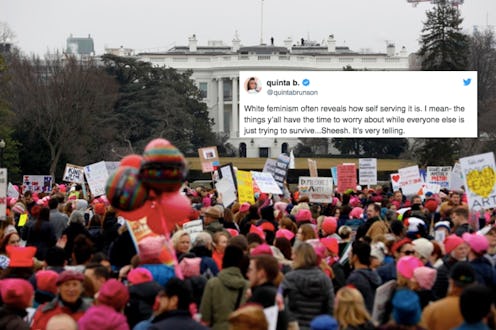Life
7 Ways White Feminism Is Sneaking Into Your Life

White feminism is a term that has been on the tip of everyone's tongue since actor Emma Watson addressed past criticisms of her feminism in statement to her book club about the topic in early January. Though it's difficult to find an exact definition for "white feminism," it has come to describe a not-quite-feminist mindset that doesn't take into account the ways the women of color experience sexism, and how it differs from the way white women experience it. Simply put, white feminism is for white women who don't want to examine their white privilege. The term "intersectional feminism," which stands in opposition to white feminism, was coined by civil rights advocate and law professor Kimberlé Crenshaw in 1989 to help describe the experiences of Black women who not only face sexism, but systemic racism.
Understanding the ways race, gender, and other factors (such as disability, class, or sexuality) intersect is crucial to making our feminism more effective and impactful. Let's face the cold, hard truth: every white woman has (wittingly or unwittingly) benefitted from systemic racism. And because it comes from a systemic issue, many of us don't realize when white feminism is sneaks into our life. Here are seven times that white feminism rears its head in our daily lives, and what you can do to combat it.
1You Don't Think "White Feminism" Exists
Sure, white feminism isn't truly feminism at all if you take an intersectional approach to dismantling oppressive systems. But to deny that "white feminism" is real just erases women of color and their voices even more. If you're not actively speaking out against white feminism and dismantling it, then you're still benefitting from systemic racism.
2You "Not All" Somebody
Conversations about race and racism can be uncomfortable, especially if you have benefitted from racism — which, ahem, all white people have. If you find yourself wanting to respond to a thought-starter with "not all white people" or "not all white women" upon hearing people of color talk about systemic racism, you may want to reflect on why whatever was said resonated with you on a personal level. Not all-ing may indicate you need to work on a certain area of your feminism to make it more intersectional.
3You Jump To The Defensive
Getting called out or receiving feedback — especially on a public social media platform — can be uncomfortable. However, if you find yourself regularly becoming defensive when discussing racism or receiving feedback in regards to your activism, that's probably a sign that white feminism is sneaking into your life. Learning from your mistakes and examining your privileges as a white person are crucial to developing a deeper understanding of the ways gender and race intersect. Being defensive when you're called out only leads to further misunderstanding and mistrust — sometimes, simply apologizing and learning from your mistake is all it takes to make a difference.
4You Don't Learn From Feedback
Even if you don't get defensive about feedback, do you actually hear what is being said? Do you make an active effort to improve yourself? White feminists often dismiss women of color the same exact way men dismiss them — by tone policing, by centering themselves, or by flat out ignoring them. If you are called out, set aside time to actually learn about why you were called out — and what you can do to avoid that behavior in the future.
5You Only Show Up When It's Convenient
Balancing your activism with self-care is an important part of not getting burned out, but ask yourself a few questions: Do you show up for issues that that don't directly have a negative impact on you? Do you sit in on Black Lives Matter meetings in addition to going to your local women's march? Or attend events about school-to-prison pipeline and the 13th Amendment? If you answered "no" to any of these questions, you might be being a bit of a white feminist. Make an effort to step outside your perspective, and participate in events, rallies, and marches focused on issues that your privilege has protected you from experiencing.
6You Tone Police
Much like not all-ing or getting defensive in conversations about systemic racism, white feminists are known for tone policing the feelings of women of color. Basically, tone policing is a way to deflect criticism by focusing on the anger or emotions being expressed, rather than the issue that's being discussed. Just like men sometimes dismiss women as "irrational" or "unstable" for emotionally talking about an issue that negatively affects them, white feminists use this technique to invalidate the feelings of people of color in an argument. If you find yourself more concerned with how something is being said said versus the substance of a conversation, you should probably take a second to refocus and de-center your feelings.
7You Only Center Women Of Color When You Tokenize Them
If you include women of color in events or discussions for the sake of appearing diverse, but you are not actually helping to make actionable change, you're probably tokenizing them. There are many ways in which white feminists tokenize people of color, and if you are unsure if you are doing this, simply ask yourself: Are you including women of color just to keep from being seen or perceived as exclusionary? If that is your main priority, you're probably being tokenizing — and that's white feminist AF.
White feminism may be tricky to recognize at times, especially because it's a pretty ingrained thought process. However, increasing your awareness around your actions may help you more proactively catch yourself being a white feminist, and stop white feminism from sneaking into your life.